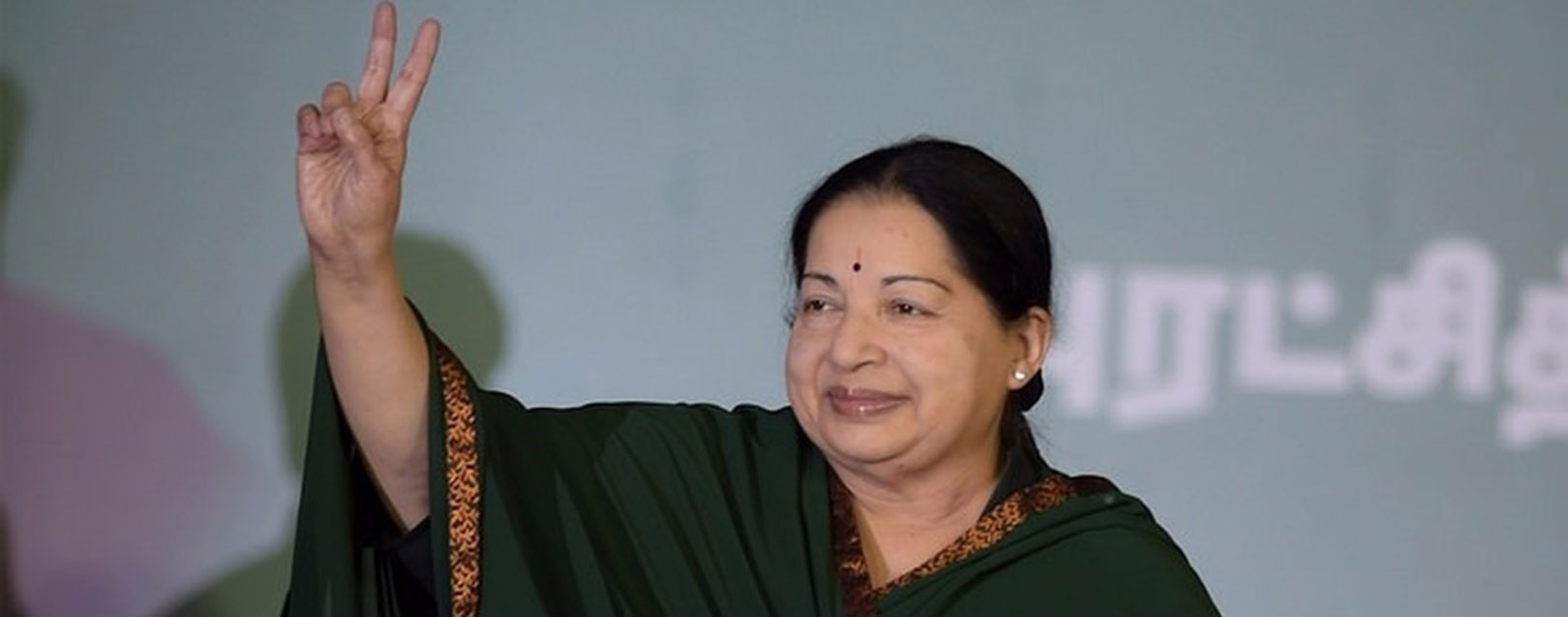
Jayalalithaa the star of Tamil Nadu fades away
Sheela Mamidenna
J. Jayalalithaa, the able and charismatic Chief Minister of Tamil Nadu, passed away on December 5 while undergoing treatment at Chennai. Known for her acumen as a keen administrator, shrewd politician and an erudite speaker, Jayalalithaa took on the development of the state of Tamil Nadu on a war footing with an iron hand. She realised early on in her career that people wanted an able administrator who would take care of all their needs and she listened to them. By offering freebies and massive subsidies, Jayalalithaa or 'Amma' as she was fondly called became the darling of her people. Among the most ambitious of her projects was the power generation and supply project.
Power generation and supply
Tamil Nadu, once power-surplus, literally fell into the dark ages, with a steadily worsening power situation, starting around the beginning of this millennium. By 2010, the situation had become so precarious that most of hinterland Tamil Nadu went without domestic and industrial power supply for almost 20-22 hours a day! While Chennai, due to its political weight, struggled with 6-8 hours of daily power cuts, the rest of the state had gone back to the pre-electricity era. Industrial production stagnated, most business units folded up due to the exorbitant costs of producing power from diesel generators.
Electricity deficit, at around 1% in 2005-06, shot up to 11% in 2011-12. During this period, electricity requirement grew at a CAGR of 9%, with availability increasing by a sub-optimal 6-7%, resulting in almost 18% peak demand deficit (in percentage).
J Jayalalithaa’s biggest contribution after she came back to power in 2011, arguably, could be the stellar performance on this front. One of the first things she did was to raise the selling cost of electricity significantly, making it viable for the state to purchase power from outside and avoid causing huge losses to the exchequer. The selling price had not been raised for almost a decade earlier, keeping the state power transmission and generation wings in deep red.
Subsequently, attacking this on multiple fronts, her government went for long-term agreements for the purchase of power from private firms and neighbouring states, actively encouraged renewable sources of energy such as the wind and solar generated power, and plugged loopholes in the system (maintenance, equipment malfunction, cable faults and power theft).
Thus, load shedding and mandatory cuts for commercial users in Tamil Nadu have now become a distant nightmare. Its demand/day of around 14,000 MWs is now met by Thermal (3800-4000 MW), Wind (3200-3500 MW), Central Generating Stations (3000 MW), Hydro (500 MW) and Gas (350 MW) sources. Thanks to the government’s policies on this front, another 16,000 MW of power is planned to be added to its power grid, 3000 MW of which is expected from solar generation.
Her rainwater harvesting project fetched laurels far and wide and Tamil Nadu became a role-model to other water-starved states in India.
Rain Water Harvesting
Tamil Nadu has been chronically water-starved, being a lower-riparian state. To address its water requirements, J Jayalalithaa initiated an ambitious Rain Water Harvesting (RWH) scheme in 2001. The goal was to ensure fully charged water sources, and the resulting improved ground water levels in the urban and rural areas.
This scheme mandated the installation, maintenance and operation of rainwater harvesting mechanisms by all private and public buildings and institutions, under the penalty of law.
The scheme, though sputtering initially, ultimately has become a role-model scheme for the rest of India. This was solely due to the commitment to this cause demonstrated by her.
In order to attract investments into the State, Jayalalithaa organised the first ever Global Investors Meet in Tamil Nadu.
Global Investors Meet, Sept 2015
Inviting global investors to take advantage of the industry-friendly policies of the Government, she outlined that under the 'Vision 2023' initiated by her Government she was confident of increasing the per capita income of her State to match with those of the developed economies.
Showcasing her State as an investment friendly one, she said that it was leading in the area of automobiles, leather, textiles, healthcare, auto components and IT among others. “The share of our services sector in the economy is one of the highest in India. Tamil Nadu attracts the third highest Foreign Direct Investment (FDI) in the country,” she said.
"In fact, the foreign investment actually coming into Tamil Nadu would be even more. A significant portion of the foreign investment made in Tamil Nadu is counted against some other states since the Indian head offices of the foreign companies are located there,” she proudly added.
She kept her promises and investors poured into the State. Amongst them were leaders in the automobile and auto components industry.
Her Automobile Policy of 2014
In 2014, Jayalalithaa came up with an ambitious “Tamil Nadu Automobile and Auto-component Policy”, aiming at confirming Chennai’s position as the “Detroit of Asia”. The goal was the “future development and consolidation of the automobile and components industry, making Chennai as one of the world’s top five auto clusters.” With a stated aim of generating five lakh jobs in this sector, it resulted in 16 MoUs being signed, valued at around Rs.5,000 crores.
J Jayalalithaa, during her 2011-2016 term as CM, also committed her government’s focused approach to encouraging sunrise sectors, such as biotechnology, nanotechnology and aerospace.
During her third term at Chief Ministership, J Jayalalithaa also adopted a strong humanitarian approach at solving day-to-day problems of the common citizens, by coming up with highly-subsidised, and highly appreciated, 'Amma canteens', 'Amma purified drinking water' via the state transport outlets, 'Amma pharmacies' and 'Amma salt', and in the pipeline were 'Amma cinema halls', Amma theaters' and 'Amma marriage halls.'
Though she met a lot of the aspirations that her people wanted, she fell short in others. But people of India will always remember her as the 21st-century woman-leader who dared to dream and build high!





 to success.
to success.